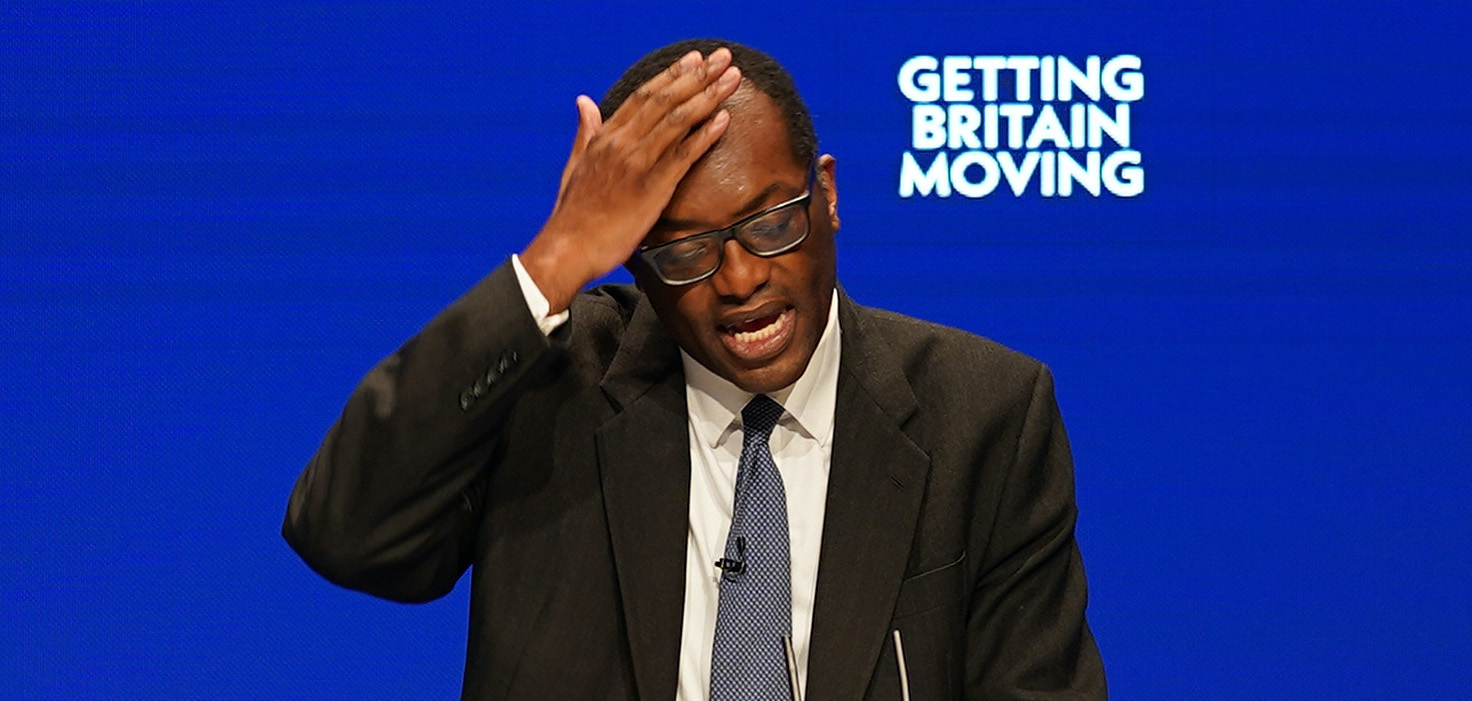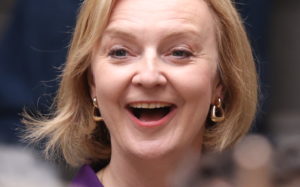No doubt Kwasi Kwarteng expected to spend yesterday morning putting the finishing touches to his Party Conference speech. Instead, 10 days after he announced his plan to scrap the top rate of income tax, Britain’s Chancellor found himself being schooled in a real-world crash course in macroeconomics — and media-fuelled hysteria.
As soon as it was made public, on September 23, Kwarteng’s “mini-budget” prompted a massive sell-off of “gilts” — UK government bonds — and also saw the pound fall to an all-time low against the dollar. Then, all hell broke loose: some analysts even went as far as saying that Britain was heading for a full-blown “currency crisis” and was starting to look like an “emerging market country”.
The reaction from international quarters was just as hysterical. The IMF launched a biting attack on the UK government, while Larry Summers, former US Treasury secretary, called the policy “utterly irresponsible”. Speaking for many, Jason Furman, former economic adviser to Barack Obama, wrote: “I can’t remember a more uniformly negative reaction to any policy announcement by both economists and financial markets than the UK’s policy.”
Was all the fuss justified? Is the UK really in danger of becoming the next Argentina or Zimbabwe? And was Kwarteng’s U-turn yesterday really necessary?
The mini-budget in question consists of a series of deficit-financed economic measures aimed at cushioning the effects of the energy crisis and boosting growth — namely a freeze on energy bills and various tax cuts, for a total cost of around £160 billion. Most of the criticism aimed at Kwarteng reflected the opinion of orthodox economists: that cutting taxes is the wrong policy when unemployment is low and there is little spare capacity in the economy for additional non-inflationary growth.
Yet for all the uproar, by far the biggest commitment in the mini-budget was found elsewhere: the energy price freeze, which is expected to cost around £60 billion. According to the Bruegel think tank, the UK is already the country that has allocated the most funding to shield households and businesses from the energy crisis — 7% of GDP. While more can and should be done, that’s more than double the EU average (only Germany has announced a measure of similar scope).
Now, one can debate whether capping the price of energy — which essentially amounts to a publicly funded subsidy for the profits of energy giants — is the best way to address the crisis, but if the alternative is hanging household and businesses out to dry, which is what most EU countries are likely to end up doing, the British approach is clearly far better.

An academic posing as an iron man
As for the revenue-side measure of the mini-budget, the biggest measures aren’t actual “tax cuts” but non-rises in National Insurance and corporation tax (for a total of £40 billion). Compared to these figures, the actual tax cuts, such as the scrapping of the higher rate of income tax, were rather trivial — just above £10 billion. All of which means that while the tax cuts were bad from a distributional perspective, since they would have mostly benefited the wealthy, from a macroeconomic perspective their impact would have been negligible, and the decision to reverse them will be just as negligible.
Even without the tax cuts, the energy price freeze will still entail a larger deficit. Rather than the tax cuts being at fault, then, it was probably the increase in the deficit itself that freaked everyone out. There seems to be a genuine concern among orthodox economists and financial institutions that the mini-budget will threaten Britain’s “fiscal sustainability” and possibly even cause the country to default.
But the notion that an increased deficit puts the British state at the risk of insolvency is ludicrous. Like all currency-issuing nations, the UK effectively spends by creating money out of thin air. This means that it can never “run out of money” or become insolvent. The fact that fiscal deficits are usually associated with the issuance of bonds, and that these are usually bought by the private financial sector, gives the impression that the latter are able to exercise control over government spending, by refusing to buy the bonds or demanding higher interest rates. However, this is not the case — because the central bank can always step in to buy the bonds itself, setting the yield at whatever level it wants.
Ever since the financial crisis, and especially throughout the pandemic, this has become standard practice. Indeed, virtually all the new bonds issued to support the economy throughout the pandemic were bought by the Bank of England itself. This is paradigmatic of the way in which modern states self-finance; and of the fact that “bond vigilantes” hold no power whatsoever over currency-issuing governments.
So overall, a widening deficit doesn’t represent a problem for the UK. In fact, it’s a good thing, insofar as it will help cushion the British economy from the effects of the energy and cost-of-living crisis. There’s also no reason to believe that larger deficits, even if “monetised” by the central bank, will further stoke inflation. Quite the opposite: if the government borrows money to cut domestic energy, that will likely reduce inflation. Injecting such large sums of money into the economy should also be expected to have a positive effect on growth.
The problem is that all this completely defies the economic orthodoxy, which is probably why mainstream economists are attacking the Government’s plan so vehemently. As Adam Tooze writes: “What the critics of the UK are performing is the role of gatekeepers, a function, which is at the heart of elite economic policy discourse.” This wouldn’t be so much of a problem if it weren’t for the fact that the flawed orthodox view is also shared by people who, unlike economists, have a direct impact on the economy — financial traders. And this can lead them to make some very bad decisions.
The recent gilt sell-off is a perfect case in point. While some traders might have actually been motivated to unload their gilt holdings through fears of an imminent default, much of the sell-off was actually an attempt to profit from the panic through a practice known as short selling — which consists in selling a financial asset in the expectation that its price will fall, thus generating a profit to the seller.
This is ultimately what economics textbooks say should have happened: a higher deficit will automatically lead to higher yields (and therefore lower prices), and scaring the government through a sell-off will convince policymakers to raise interest rates even more. Unfortunately for the traders, this is not how things work in the real world. In the latter, betting against central banks is always a losing game. They know that very well in Japan, where it’s known as the “widow maker” trade.
Which is why traders were completely caught off-guard when, on September 28, the Bank of England announced that it would be buying up a potentially limitless number of government bonds in order to ease market tensions. This immediately caused yields to fall and stabilise at the level they were at before all the mini-budget hoo-ha — thus thwarting the speculators’ plans.
It’s been said that the BoE’s intervention “saved” the Government from the consequences of its reckless decisions. This is also nonsense. The BoE was simply fulfilling its mandate — acting as a lender of last resort. Moreover, in a democracy, it’s perfectly normal for the central bank to accommodate the budgetary decisions of government. The alternative is the situation in the Eurozone — where democratically elected governments are expected to do what unelected technocrats and central bankers tell them to.
There has been much talk of the fact that the BoE was forced to intervene to save pension funds that would otherwise have faced “mass defaults”. This all sounds rather scary, and has been weaponised to attack the mini-budget — by implying that the Government’s actions risked sending the savings of millions up in smoke. In fact, the pension funds’ quasi-meltdown is entirely a consequence of the way pension systems, like everything else, have become hyper-financialised.
Simply put, today pension funds use safe assets such as gilts to raise large amounts of cash through complex financial instruments, which they then use to pursue high-risk investment strategies. The problem is that if the value of the gilts falls too sharply, the pension funds risk going bust — which is what happened last week following the gilt panic. The problem’s not the mini-budget — the problem’s the way in which we’ve allowed pension funds to gamble with people’s savings.
A similarly doom-laden tone accompanied warnings about a “currency crisis” in which the pound will supposedly keep sliding further and further down until it becomes so worthless that the UK will be forced to go cap-in-hand to the IMF. But this was never likely to happen. Countries that float their exchange rate, such as the UK, cannot experience a currency crisis in the traditional understanding of the term — unless they have large external liabilities in a foreign currency. As Paul Krugman observed, that was the story for Asia in the Nineties, the Argentine crisis 2001, and is part of the problem in Turkey now. But this doesn’t apply to the UK, whose external liabilities are overwhelmingly sterling-denominated. And this is why, following the Bank of England’s intervention, the value of the pound has already bounced back to the level it was before the panic.
Why did the pound fall in the first place? This was due to much the same reasons as the gilt sell-off: unfounded fears over the deficit, attempts to pressure the government into backtracking, and, first and foremost, speculators in the City and elsewhere hoping to profit by shorting the pound. As one trader said: “We were absolutely sure the pound was going to crash. Of course we are going to short the pound. This is what we do.”
The problem is that, unlike bond markets, the government’s options are more limited when it comes to quelling future currency speculation. One option would be for the Bank of England to prop up the pound by buying it on foreign-exchange markets, but that requires large amounts of foreign reserves, which the UK doesn’t have.
Another option would be to raise interest rates. After all, part of sterling’s weakness is simply the result of rising interest differentials vis-à-vis the US, which is hiking up interest rates in an irresponsible manner that is causing problems for the rest of the world, as central banks are forced to raise interest rates to stem the outflow of capital. However, raising interest rates won’t reduce inflation that is entirely driven by supply-side factors — namely the energy crisis and supply-chain bottlenecks — but will almost certainly cause huge pain to the economy, especially to the housing market, which is already in trouble. (Even the UN is now calling on central banks to halt interest rate increases.)
So, it’s a good thing that the Bank of England is still refusing to hike interest rates. After all, the pound has been sliding against the dollar for more than a year, indicating that this part of a longer-term adjustment which could actually help Britain move towards a less import-dependent and more self-reliant economy.
In the end, the best option for the UK’s authorities might to be accept there’s little they can do, in the short term, to rein in inflation that is largely supply side-driven, stop attempting to prevent the pound from falling in the name of some misconceived “strong pound” policy (which is what led to the government’s flawed response to the 1976 crisis) — and focus instead on protecting people and businesses through increased government spending.
This may or may not be inflationary. But the alternative — giving in to market pressure to raise interest rates and rein in the deficit — is almost certainly bound to be worse.
Disclaimer
Some of the posts we share are controversial and we do not necessarily agree with them in the whole extend. Sometimes we agree with the content or part of it but we do not agree with the narration or language. Nevertheless we find them somehow interesting, valuable and/or informative or we share them, because we strongly believe in freedom of speech, free press and journalism. We strongly encourage you to have a critical approach to all the content, do your own research and analysis to build your own opinion.
We would be glad to have your feedback.
Source: UnHerd Read the original article here: https://unherd.com/



